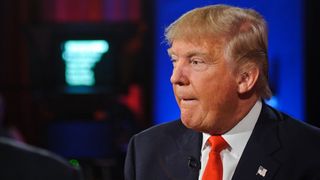Trump Exhumes Veiled Threat to Change Libel Laws

President Donald Trump has renewed his suggestion that libel laws might need to be tightened so he could pursue news outlets whose stories he feels are wrong or unjustified attacks.
In a tweet Thursday morning, the President once again took aim at one of the mainstays of the mainstream media.
"The failing @nytimes has disgraced the media world," he wrote. "Gotten me wrong for two solid years. Change libel laws?"
That followed a tweet from March 29: "Remember when the failing @nytimes apologized to its subscribers, right after the election, because their coverage was so wrong. Now worse!"
He did not say which particular story prompted the tirade, though the paper has been reporting regularly on the Russian hacking investigations and Thursday had stories about Trump leaving science jobs vacant and going after Freedom Caucus members over the healthcare bill, as well as reports on the Senate Intelligence Committee hearing on Russian hacking and Ivanka Trump becoming a federal employee.
Libel laws in the U.S. include both a truth test and a malice test, particularly with regard to high-ranking public figures such as presidents and presidential candidates. The truth test, which dates back to 1734, requires the plaintiff to prove the statements were patently false; the malice test, which goes back to the 1964 Supreme Court decision in 'New York Times' v. Sullivan, requires that the news organization in question knowingly printed falsehoods with a reckless disregard for their accuracy.
Prior to the election then-candidate Trump's threats to change libel laws so he could sue media outlets, including The Times, led the Committee to Protect Journalists to brand him a threat to press freedom "unknown in modern history."
Broadcasting & Cable Newsletter
The smarter way to stay on top of broadcasting and cable industry. Sign up below
Following the election, Trump met with Times editors and appeared to soften his stance on the libel law threat but seemingly for practical rather than philosophical reasons: "Actually, somebody said to me on that, they said, ‘You know, it’s a great idea, softening up those laws, but you may get sued a lot more.’ I said, ‘You know, you’re right, I never thought about that.’ I said, ‘You know, I have to start thinking about that.’ So, I, I think you’ll be O.K. I think you’re going to be fine," he told NYT editors in the Nov. 23 interview.
Contributing editor John Eggerton has been an editor and/or writer on media regulation, legislation and policy for over four decades, including covering the FCC, FTC, Congress, the major media trade associations, and the federal courts. In addition to Multichannel News and Broadcasting + Cable, his work has appeared in Radio World, TV Technology, TV Fax, This Week in Consumer Electronics, Variety and the Encyclopedia Britannica.

